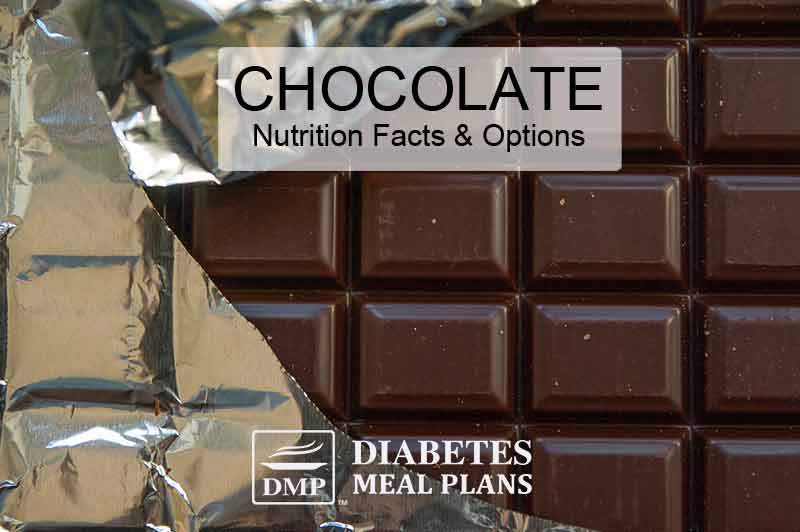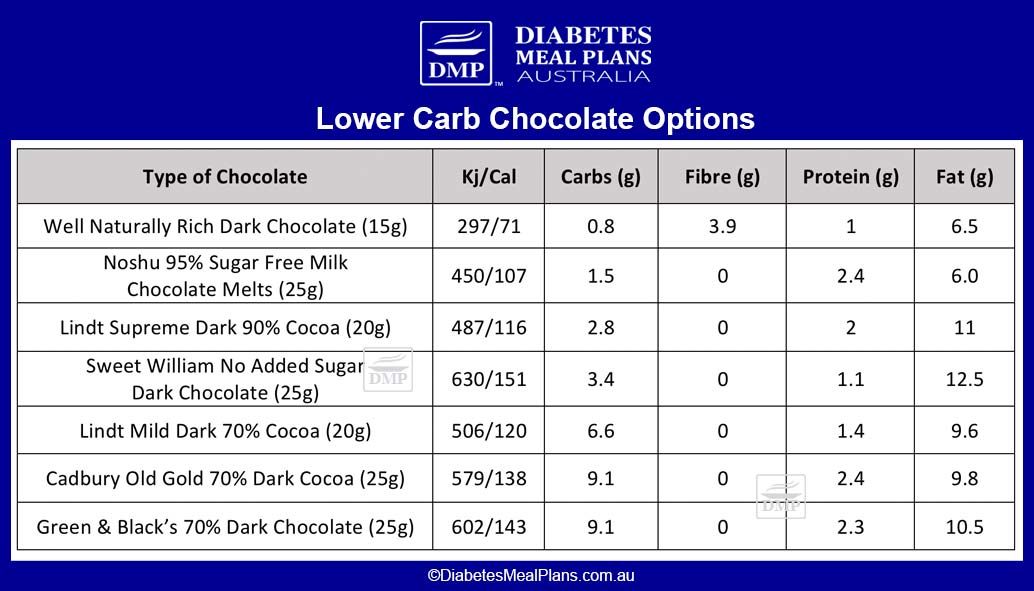Nothing quite matches the flavour and texture of a silky piece of chocolate…so with prediabetes and type 2 diabetes, you may be wondering, is there any chocolate you can eat?
As long as you choose the right kind of chocolate, then the answer is yes!
In fact, eating a bit of chocolate can have its health benefits.
Chocolate Nutrition Facts
Macronutrients
Here’s what you’ll roughly get from one serving (28g) of a non-branded dark chocolate bar:
- Kilojoules/Calories: 648/155
- Carbohydrates: 15.6g
- Protein: 1.4g
- Fat: 9g
- Fibre: 2g

If you glance at the amount of protein, fat and carbohydrates, you can see that this dark chocolate contains more grams of carbs than anything else. While the amount of carbs and added sugars will vary between types of chocolate and between brands, overall, your average bar of chocolate is a high carb food!
The 9g of fat in that chocolate bar are a result of the cocoa butter (vegetable fat) that was extracted from the cocoa beans and added to the chocolate to give it that soft, melt-in-your-mouth texture. That’s one thing we love about chocolate, right?
Micronutrients in Chocolate
We typically think of chocolate as “junk food” because of all the “junk” that is added to it to make it super-palatable. When you remove all of the added sugars, unhealthy oils, and chemical additives, cocoa actually contains some health-promoting compounds.
Dark chocolate contains antioxidants like flavanols and polyphenols that fight free-radical damage and oxidative stress.
In it’s unprocessed form, chocolate also contains a good balance of minerals like iron, magnesium, and zinc!
Comparing Types of Chocolate
Different brands of white, dark, and milk chocolate may all contain varying amounts of “added” sugar, which means their carb counts will vary a lot.
As a general rule, dark chocolate carries the least sugar. White chocolate tends to have the most sugar and the least amount of cocoa solids (from the actual cacao plant), which explains why it’s so sweet. Milk chocolate is usually somewhere in the middle.
Here are a few different brands and types of chocolate to compare.

We have listed dark chocolates because they tend to be the lowest in carbs, which is ideal for you.
Options like Well Naturally and Noshu contain little to no added sugar. Instead they rely mostly on natural sweeteners to make their chocolate taste sweet.
Naturally, chocolates with alternative sweeteners will be more blood sugar friendly. But, choose sugar free options wisely! Avoid aspartame, sucralose and saccharin – or the numbers 950, 951, 954 and 955.
Other dark chocolate options like Lindt’s can be a good option as well — they contain added sugar but in low amounts. Cadbury and Green & Blacks and other dark chocolate varieties can still fit in the equation when limited to the correct serving sizes – read more below.
Research Facts on Chocolate
- In nature, cocoa is rich with bioactive compounds called flavonoids that are anti-inflammatory and antioxidant, and dark chocolate that is less processed will still contain some of these benefits.
- Research showed that eating dark chocolate every day for a week (providing 700 mg of flavonoids per day) lowed LDL “bad” cholesterol levels fell by 6%, and raised HDL “good” cholesterol rose by 9% in healthy participants. The flavonoids also lowered pro-inflammatory molecules in some of the participants.
- Another study found that people with type 2 diabetes who consumed 25 g of dark chocolate every day for 8 weeks had reduced fasting blood glucose and HbA1c levels, along with reduced inflammation and significantly decreased blood pressure by the end of the study.
- The effects of cocoa flavonoids may be especially significant for type 2 diabetics because of their ability to increase insulin sensitivity.
- In one study, people with impaired glucose tolerance consumed 100 g of flavanol-rich dark chocolate for 15 days, and the results showed a decrease in insulin resistance, increased insulin sensitivity, and better beta–cell function compared to those who ate flavanol-free white chocolate.
- A 2016 study found that cocoa can improve vasodilatation and blood flow, which is good for heart health and body wide circulation.
- In general, a greater intake of cocoa flavonoids has been associated with a more optimal body composition, decreased fat mass, and an overall anti-obesity effect.
Those cocoa polyphenols, found particularly in dark chocolate, actually provide health benefits, which means, go ahead and enjoy your dark chocolate!
Best Aussie Chocolates to Eat
The best type of chocolate you can aim for is one that is low in carbs/sugar. This will usually be either a very dark chocolate bar (70-90% cacao) or a chocolate that is sweetened with alternative sweeteners like stevia, erythritol, monk fruit, xylitol and so forth.
Here are some of the more diabetic friendly options available, plus where to buy them:
- Well Naturally (available at Woolworths, Coles, and IGA) – 1g carbs
- Sweet William (available at Coles) – 1g carbs
- Cadbury Old Gold 70% Dark (available at Woolworths, Coles, and IGA) – stick to a small portion, 2 pieces (4.5g carbs)
- Green & Black’s Cocoa Smooth Dark (available at Coles) – stick to just 1 row on this chocolate bar (6g carbs)
- Noshu 98% Sugar Free Baking Chips (available at Woolworths and Coles), 1.4g carbs per serve
- Lindt Dark Excellence 78% (5g carbs), 85% (4g), or 90% (3g) Dark Chocolate (available at Woolworths and Coles) – stick to 1 serving size on label
- Whittakers Dark Ghana (available at Woolworths and Coles) – stick to a small portion, 2 pieces (6.4g carbs)
- Pico Vegan Chocolate Super Dark (available at Woolworths), one row is 4g carbs
- Nestle Plaistowe Dark Chocolate Baking Block (available at Woolworths and Coles) – stick to a small portion, 2 pieces (5.5g carbs)
- Coles Finest Belgian Dark Chocolate, one row is 9.2g carbs
IGA also stocks Cadbury’s Old Gold, Nestle Plaistowe Dark Chocolate and Lindt.
Recommendation for Chocolate and Type 2 Diabetes
Feel free to enjoy chocolate occasionally as a sweet treat, choosing dark chocolate over other types.
Always choose a chocolate with the lowest carbs/sugar and be mindful of how much you’re consuming. Portion your chocolate out before you eat it so you don’t go overboard, especially if it’s not an ultra-low carb option.
The serving sizes for most chocolate bars is only 15-25g. A regular sized chocolate bar is about twice or three times that size. If you’re going to indulge in some tasty chocolate, keep your eyes on that serving size and be diligent about your portion.
Other Questions About Chocolate
Is Cocoa Powder OK For Baking?
Yes, just be sure to choose an unsweetened cocoa powder to keep carbs low. You can also use chocolate flavoured liquid stevia drops to sweeten your recipes.
What about diabetic easter eggs?
When easter time comes around, the same rules apply. Look for easter eggs that are dark chocolate with lower carb and sugar content.
Are there sugar free chocolate options for diabetes?
Yes. Some suitable options include Well Naturally available at Woolworths, Coles, and IGA; Noshu 98% Sugar Free Baking Chips available at Woolworths and Coles; and Sweet William available at Coles.
What is the best cocoa powder for diabetes?
Any cocoa powder that is sugar free is suitable for people with diabetes. We love using a rich Dutch cocoa powder as these tend to be richer and tastier than your regular cocoa powder. Nestle have a Dutch option and each year around christmas Aldi usually stock a richly delicious Dutch cocoa powder (Choceur). We normally buy a few tubs and it keeps in the pantry a long time.

Lower Blood Sugar, Lose Weight, Live Better — It All Starts Here
Join Dr. Jedha’s free bi-weekly eNews — discover Aussie supermarket finds, food swaps, and trusted blood sugar advice tailored to life in Australia.
